
The Beatles were an English rock band, formed in Liverpool in 1960, that comprised John Lennon, Paul McCartney, George Harrison and Ringo Starr. They are regarded as the most influential band of all time and were integral to the development of 1960s counterculture and popular music's recognition as an art form. Rooted in skiffle, beat and 1950s rock 'n' roll, their sound incorporated elements of classical music and traditional pop in innovative ways; the band later explored music styles ranging from ballads and Indian music to psychedelia and hard rock. As pioneers in recording, songwriting and artistic presentation, the Beatles revolutionised many aspects of the music industry and were often publicised as leaders of the era's youth and sociocultural movements.
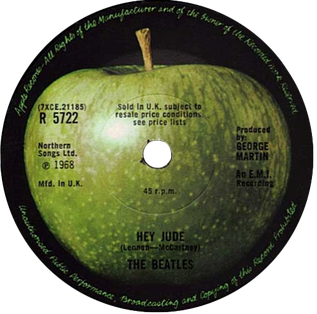
"Hey Jude" is a song by the English rock band the Beatles that was released as a non-album single in August 1968. It was written by Paul McCartney and credited to the Lennon–McCartney partnership. The single was the Beatles' first release on their Apple record label and one of the "First Four" singles by Apple's roster of artists, marking the label's public launch. "Hey Jude" was a number-one hit in many countries around the world and became the year's top-selling single in the UK, the US, Australia and Canada. Its nine-week run at number one on the Billboard Hot 100 tied the all-time record in 1968 for the longest run at the top of the US charts, a record it held for nine years. It has sold approximately eight million copies and is frequently included on music critics' lists of the greatest songs of all time.
Apple Records is a record label founded by the Beatles in 1968 as a division of Apple Corps Ltd. It was initially intended as a creative outlet for the Beatles, both as a group and individually, plus a selection of other artists including Mary Hopkin, James Taylor, Badfinger, and Billy Preston. In practice, the roster had become dominated by the mid-1970s with releases of the former Beatles as solo artists. Allen Klein managed the label from 1969 to 1973, then it was managed by Neil Aspinall on behalf of the Beatles and their heirs. Aspinall retired in 2007 and was replaced by Jeff Jones.

"Something" is a song by the English rock band the Beatles from their 1969 album Abbey Road. It was written by George Harrison, the band's lead guitarist. Together with his second contribution to Abbey Road, "Here Comes the Sun", it is widely viewed by music historians as having marked Harrison's ascendancy as a composer to the level of the Beatles' principal songwriters, John Lennon and Paul McCartney. Two weeks after the album's release, the song was issued on a double A-side single, coupled with "Come Together", making it the first Harrison composition to become a Beatles A-side. The pairing was also the first time in the United Kingdom that the Beatles issued a single containing tracks already available on an album. While the single's commercial performance was lessened by this, it topped the Billboard Hot 100 in the United States as well as charts in Australia, Canada, New Zealand and West Germany, and peaked at number 4 in the UK.
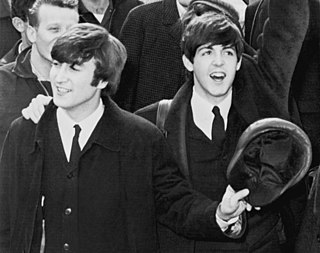
Lennon–McCartney was the songwriting partnership between English musicians John Lennon (1940–1980) and Paul McCartney of the Beatles. It is the best-known and most successful musical collaboration ever by records sold, with the Beatles selling over 600 million records worldwide as of 2004. Between 5 October 1962 and 8 May 1970, the partnership published approximately 180 jointly credited songs, of which the vast majority were recorded by the Beatles, forming the bulk of their catalogue.

"Hello, Goodbye" is a song by the English rock band the Beatles, written by Paul McCartney and credited to Lennon–McCartney. Backed by John Lennon's "I Am the Walrus", it was issued as a non-album single in November 1967, the group's first release since the death of their manager, Brian Epstein. The single was commercially successful around the world, topping charts in the United States, the United Kingdom, New Zealand, Canada, Australia and several other countries.
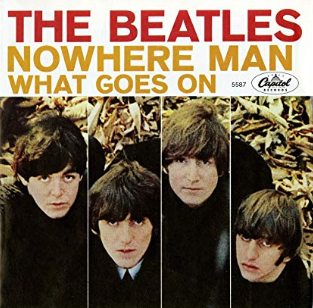
"Nowhere Man" is a song by the English rock band the Beatles. It was released in December 1965 on their album Rubber Soul, except in the United States and Canada, where it was first issued as a single A-side in February 1966 before appearing on the album Yesterday and Today. The song was written by John Lennon and credited to the Lennon–McCartney partnership. In the US, the single peaked at number 3 on the Billboard Hot 100 and number 1 on the chart compiled by Record World magazine, as it did the RPM 100 chart in Canada and in Australia. The song was also released as a single in some countries where it had been included on Rubber Soul, including Australia, where it topped the singles chart.
"Across the Universe" is a song by the English rock band the Beatles. It was written by John Lennon and credited to Lennon–McCartney. The song first appeared on the 1969 various artists' charity compilation album No One's Gonna Change Our World and later, in a different form, on their 1970 album Let It Be, the group's final released album. The original version featured on two different albums both titled Rarities: a 1978 British release and a 1980 US release. It was also included on their 1988 album Past Masters, Volume Two. The song has been covered by many artists, including David Bowie on his 1975 album Young Americans, which featured contributions from Lennon.

"Happiness Is a Warm Gun" is a song by the English rock band the Beatles from their 1968 album The Beatles. It was written by John Lennon and credited to the Lennon–McCartney partnership. The song was composed into three distinct sections, referred by Lennon as "the Dirty Old Man", "the Junkie" and "the Gunman ". He derived the title from an NRA magazine and explained that the lyrics were a double entendre for guns and his sexual desire for Yoko Ono.

"You Know My Name " is a song by the English rock band the Beatles originally released as the B-side of the single "Let It Be" on 6 March 1970. Although first issued with their final single, it was recorded in four separate sessions beginning with three in May and June 1967, with one final recording session conducted in April 1969. The song features a saxophone part played by Brian Jones of the Rolling Stones.

"Ob-La-Di, Ob-La-Da" is a song by the English rock band the Beatles from their 1968 double album The Beatles. It was written by Paul McCartney and credited to the Lennon–McCartney partnership. Following the album's release, the song was issued as a single in many countries, although not in the United Kingdom or the United States, and topped singles charts in Australia, Japan, New Zealand, Switzerland and West Germany. When belatedly issued as a single in the United States in 1976, it peaked at number 49 on the Billboard Hot 100.

"The Ballad of John and Yoko" is a song by the English rock band the Beatles that was released as a non-album single in May 1969. It was written by John Lennon and credited to the Lennon–McCartney partnership, and chronicles the events surrounding the wedding of Lennon and Yoko Ono. The song was the Beatles' 17th and final UK number-one single. In the United States, it was banned by some radio stations due to the lyrics' reference to Christ and crucifixion. The single peaked at number 8 on the US Billboard Hot 100. The song has subsequently appeared on compilation albums such as Hey Jude, 1967–1970 and 1.
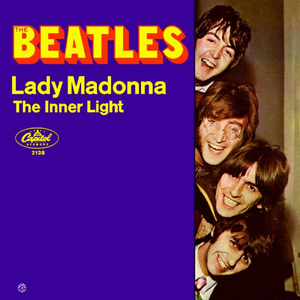
"Lady Madonna" is a song by the English rock band the Beatles, written primarily by Paul McCartney and credited to Lennon–McCartney. In March 1968, it was released as a mono single, backed with "The Inner Light". The song was recorded on 3 and 6 February 1968 before the Beatles left for India, and its boogie-woogie style signalled a more conventional approach to writing and recording for the group following the psychedelic experimentation of the previous two years.
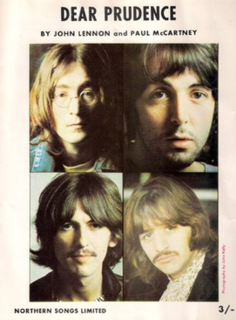
"Dear Prudence" is a song by the English rock band the Beatles from their 1968 double album The Beatles. The song was written by John Lennon and credited to the Lennon–McCartney partnership. Written in Rishikesh during the group's trip to India in early 1968, it was inspired by actress Mia Farrow's sister, Prudence Farrow, who became obsessive about meditating while practising with Maharishi Mahesh Yogi. Her designated partners on the meditation course, Lennon and George Harrison, attempted to coax Farrow out of her seclusion, which led to Lennon writing the song.
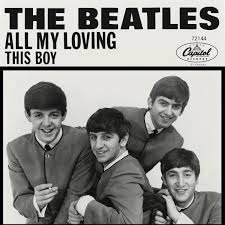
"All My Loving" is a song by the English rock band the Beatles, from their second UK album With the Beatles (1963). It was written by Paul McCartney, and produced by George Martin. Though not officially released as a single in the United Kingdom or the United States, the song drew considerable radio airplay, prompting EMI to issue it as the title track of an EP. The song was released as a single in Canada, where it became a number one hit. The Canadian single was imported into the US in enough quantities to peak at number 45 on the US Billboard Hot 100 in April 1964.

Let It Be is a 1970 British documentary film starring the Beatles and directed by Michael Lindsay-Hogg. The film documents the group's rehearsing and recording songs in January 1969 for what was to become their twelfth and final studio album Let It Be. The film includes an unannounced rooftop concert by the group, the last public performance of the four together.
Alexander Young, better known as George Alexander, was a Scottish singer, songwriter, saxophonist, bassist, guitarist and session musician. He was an elder brother of George Young, the rhythm guitarist and founding member of the Easybeats, as well as Malcolm and Angus Young, founding members of the Australian hard rock band AC/DC, and the younger brother of Stephen Young, the father of Stevie Young, who is also a member of AC/DC.

"Remember Love" is a song written by Yoko Ono and initially released as the b-side of John Lennon's and Ono's 1969 single "Give Peace a Chance."
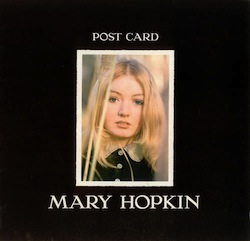
Post Card is the debut album by Mary Hopkin. It was produced by Paul McCartney and released by Apple Records in February 1969 in the UK and in March 1969 in the US. It reached number 3 in the UK and number 28 in the US. It also reached number 24 in Canada. The original US and Canadian versions differed from the UK version by including the hit single "Those Were the Days" instead of a cover of "Someone to Watch Over Me".
Terence James Doran was an English luxury car dealer, pop music manager and music publishing executive, best known for his association with the Beatles. With Beatles manager Brian Epstein, he co-owned Brydor Cars in the 1960s, supplying sportscars to many figures in the Swinging London era, including the Beatles and members of the Rolling Stones and the Moody Blues. In 1967, he became the manager of Apple Publishing, the first appointment in the Beatles' Apple Corps business organisation. He also managed the Apple artists Grapefruit and Mary Hopkin. He was a personal assistant to John Lennon and then George Harrison. Throughout the 1970s, he worked as Harrison's estate manager at Friar Park in Oxfordshire and assisted in restoring the property.













